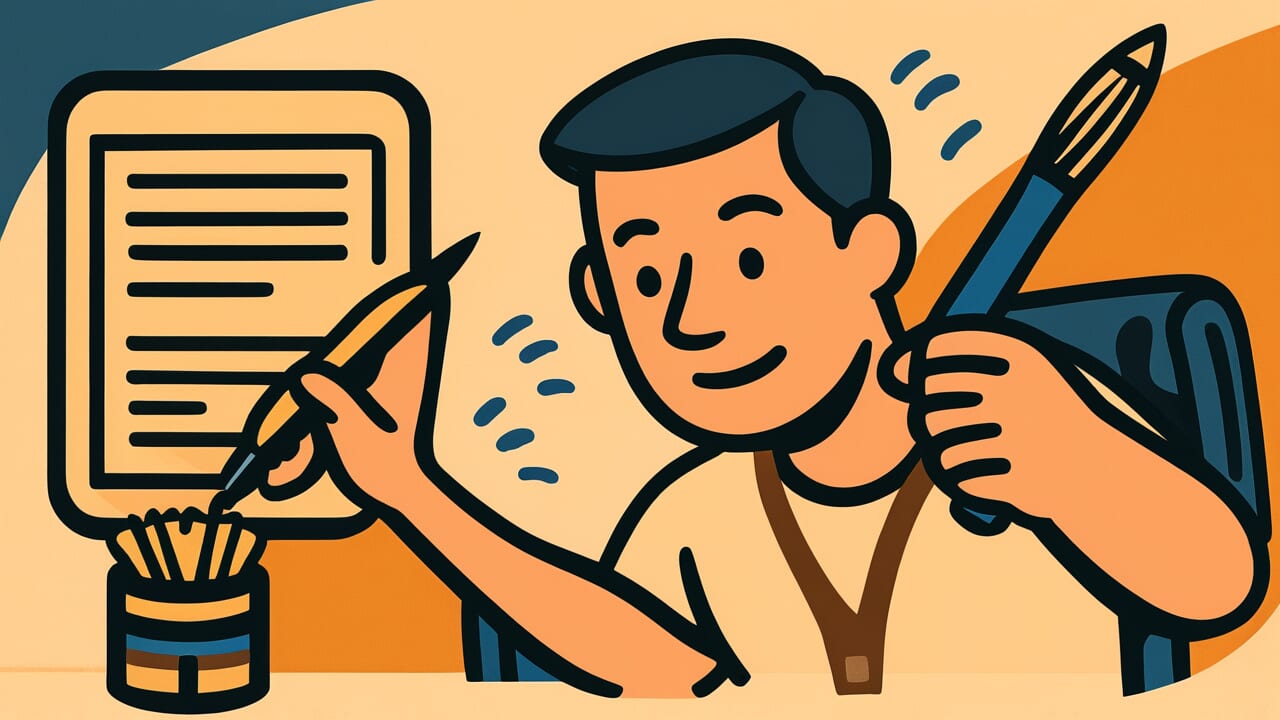How to Read “A skilled calligrapher does not choose their brush”
Nōsho fude wo erabazu
Meaning of “A skilled calligrapher does not choose their brush”
“A skilled calligrapher does not choose their brush” means that truly capable people are not affected by their tools or environment. It shows that real masters can demonstrate their abilities under any conditions.
This proverb is often used in contrast to inexperienced people who make excuses by blaming their tools or environment. It’s used in contexts that praise skilled people, like “That person is like a skilled calligrapher who does not choose their brush—they produce results in any situation.”
In modern times, we see the truth of these words when athletes show amazing performance with old equipment, or when craftspeople create magnificent works with simple tools.
In the business world, it’s used to evaluate people who achieve results despite limited resources or unfavorable conditions. This proverb contains a deep insight: true ability is an inner strength that doesn’t depend on external conditions.
Origin and Etymology
The exact first appearance of this proverb in literature is unclear, but its structure reveals an interesting background.
“Nōsho” refers to someone skilled in calligraphy—a master of the art. In ancient Japan, calligraphy wasn’t just a technique for writing characters. It was an important art form that expressed one’s character and education.
From the Heian period, it was essential learning for nobles. By the Edo period, it had spread widely among the samurai class.
This proverb expresses the observation that such calligraphy masters don’t choose their brushes. At that time, brushes were very expensive, and obtaining a good brush wasn’t easy.
Yet true masters could create magnificent calligraphy even without luxury brushes, or even with old, worn brushes.
This expression likely arose from facts actually observed in the calligraphy world. Beginners blame their tools more, while masters never use tools as an excuse.
This universal truth was put into words through the specific context of calligraphy.
Eventually, this saying spread beyond the calligraphy world. It became a universal lesson applicable to all skills and work.
Usage Examples
- She’s like a skilled calligrapher who does not choose their brush—she gives persuasive presentations in any meeting room
- They say a first-class chef is like a skilled calligrapher who does not choose their brush, and he creates exquisite dishes even with home cooking pans
Universal Wisdom
The universal truth that “A skilled calligrapher does not choose their brush” speaks to is an answer to the question of where human essential power resides.
We humans have a psychology that makes us want to seek external causes when facing difficulties. The tools are bad, the environment is bad, the timing is bad. Thinking this way lets us look away from our own inexperience.
However, this proverb blocks such escape routes with a strict yet warm gaze.
What is true ability? It’s not something fragile that only appears when external conditions are perfect. It’s an inner strength that can be demonstrated consistently in any situation.
A calligraphy master can write masterpieces with an old brush because their technique is deeply engraved not just in their hands, but in their heart and body.
This proverb has been passed down for so long because it strikes at the essence of human growth. Beginners blame their tools, intermediate practitioners obsess over tools, and masters transcend tools.
This growth pattern is universal across all fields.
Our ancestors understood this. True power is something you cultivate within yourself, unaffected by conditions. It’s not just technical skill, but spiritual maturity as well.
When AI Hears This
When you examine the brain of a skilled calligrapher, an amazing phenomenon occurs. When ordinary people use a new brush, the prefrontal cortex—the “conscious thinking part”—works actively.
This is because they write while consciously checking the brush’s weight, bristle hardness, and water absorption one by one. However, in the expert’s brain, this prefrontal cortex activity drops dramatically. In other words, they’re not “thinking about” the tool’s differences.
This is due to brain plasticity—the brain’s ability to change through experience. After thousands of hours using brushes, the cerebellum and motor cortex, which govern unconscious movement, build circuits that automatically correct for brush characteristics.
For example, with a heavy brush they unconsciously reduce force, and with a light brush they naturally apply more force. This correction completes in less than 0.1 seconds, so the person doesn’t even realize they’ve “adjusted.”
Even more interesting is that the expert’s brain recognizes the tool as an “extension of the body.” In neuroscience, this is called body schema—the same as a tennis player’s racket or a driver’s sense of their car’s dimensions.
To the brain, the brush is no longer an “external object” but “part of one’s own fingers.”
In other words, this proverb wasn’t expressing a spiritual idea about not choosing tools. It was expressing the neural mechanism by which the brain integrates tools as part of one’s own body.
Lessons for Today
What this proverb teaches us today is the importance of polishing ourselves before blaming our environment or tools.
Modern society overflows with convenient tools and services. The latest smartphones, high-performance computers, comfortable office environments. Yet even with all these, some people can’t produce results, while others achieve amazing outcomes with limited resources.
Where does this difference come from?
The answer is whether you’ve cultivated essential power within yourself. Tools are certainly convenient, but if you rely on them too much, you become someone who can’t do anything without them.
What matters is developing the flexibility and adaptability to demonstrate your abilities in any situation.
If you feel you’re not getting the results you want because of your environment or conditions, stop and think. Is it really the tools or environment that’s the problem, or do you need to polish your fundamental abilities more?
True ability is universal power that can be demonstrated in any situation. Cultivating that power is what will guide you to becoming a person of genuine skill.



Comments